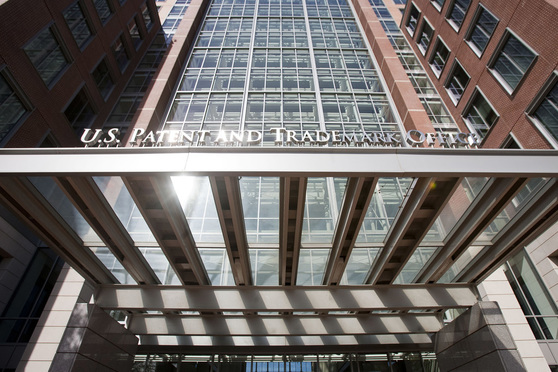Federal Circuit Panel Cool to Takings Claim in PTAB Case
Trading Technologies Inc. argues that patents it obtained before the America Invents Act shouldn't be subject to cancellation without just compensation.
February 11, 2019 at 11:31 AM
4 minute read
The original version of this story was published on National Law Journal
 U.S. Patent Trademark Office. Photo: Diego M. Radzinschi/ALM
U.S. Patent Trademark Office. Photo: Diego M. Radzinschi/ALM
When the Patent and Trademark Office cancels patents in America Invents Act proceedings, is that an unconstitutional taking of property without compensation?
The U.S. Supreme Court described it as an open question last year, but the U.S. Court of Appeals for the Federal Circuit didn't sound eager to run with it during arguments last week.
A Justice Department lawyer faced minimal pushback as she defended a patent owner's constitutional challenge to covered business method review, one of several methods established by the AIA for attacking patent validity at the PTO.
“We agree that valid patents are property interests,” Katherine Twomey Allen told the court during IBG v. Trading Technologies. “Our point on the takings issue is merely that when the board cancels a patent,” and the Federal Circuit subsequently affirms that decision, “the patent owner never had a valid property right, and therefore there was no taking.”
The Supreme Court ruled last year in Oil States v. Greene's Energy that AIA proceedings do not violate Article III or the Seventh Amendment. But Justice Clarence Thomas' opinion emphasized the narrowness of the holding. He explicitly noted that the court was not deciding if the cancellation of a patent issued before the AIA came into law in 2011 would effect a taking.
Trading Technologies Inc. is seeking to explore that issue in a series of appeals argued Thursday. The Federal Circuit in 2017 found two patents on a graphical user interface for electronic trading eligible for patent protection, but the Patent Trial and Appeal Board subsequently found two nearly identical patents ineligible later that year.
When it obtained its patents in the early 2000s, Trading Technologies had no way of knowing the AIA would be enacted and lead to mass invalidations, Trading Technologies argues. Covered business method review “violates the takings and due process clauses of the Fifth Amendment to the United States Constitution by retroactively depriving [Trading Technologies] of its property in a non-Article III forum without a jury,” the company argued in briefs to the court.
Most of the argument on takings turned on whether Trading Technologies should even be allowed to raise the issue on appeal. Allen argued the company forfeited the issue by failing to present it to the Patent Trial and Appeal Board. Trading Technologies says doing so would have been futile because administrative agencies can't rule on constitutional challenges.
Allen pointed out that the PTAB has addressed constitutional challenges, such as in the recent sovereign immunity decisions.
Judges Kimberly Moore and Jimmie Reyna sounded skeptical. “It's been my understanding that the PTO, as part of the executive branch, isn't permitted to rule on constitutional challenges,” Moore said. “Am I just completely mistaken in my understanding of the law?”
“Well, your honor, I know that the board has addressed constitutional issues in the past,” Allen said.
“I don't care if the board's done it in the past,” Moore said. “Here we've got an argument that they're not permitted to do it. And I want to know from you, are they permitted?”
“My understanding is the same as Judge Moore,” Reyna said. “Could the PTO rule itself unconstitutional?”
Allen argued that it would not have been futile for Trading Technologies to raise the retroactivity issue, because the PTAB, without ruling directly on the constitutional question, could have exercised its discretion not to institute proceedings or terminate them if it believed the constitutional challenge had merit.
As to the merits of the takings claim, she argued that the cancellation of a patent through covered business method review does not constitute a taking, “because it rests on a determination that the patent holder never had a valid property interest in the first instance.”
Baker & Hostetler partner Michael Gannon argued for Trading Technologies. Byron Pickard of Sterne, Kessler, Goldstein & Fox argued for PTAB petitioner IBG, also known as Interactive Brokers Group.
This content has been archived. It is available through our partners, LexisNexis® and Bloomberg Law.
To view this content, please continue to their sites.
Not a Lexis Subscriber?
Subscribe Now
Not a Bloomberg Law Subscriber?
Subscribe Now
NOT FOR REPRINT
© 2025 ALM Global, LLC, All Rights Reserved. Request academic re-use from www.copyright.com. All other uses, submit a request to [email protected]. For more information visit Asset & Logo Licensing.
You Might Like
View All
Litigator of the Week: Reversing a $2B Trade Secret Verdict, the Largest in Va. History

Litigators of the Week: Irell Duo Lands Another Big West Texas Win, This Time $240M for StreamScale

Litigators of the Week: In Delaware Chancery Trial, Latham Defends Oracle's $9.3B NetSuite Deal
Trending Stories
- 1How ‘Bilateral Tapping’ Can Help with Stress and Anxiety
- 2How Law Firms Can Make Business Services a Performance Champion
- 3'Digital Mindset': Hogan Lovells' New Global Managing Partner for Digitalization
- 4Silk Road Founder Ross Ulbricht Has New York Sentence Pardoned by Trump
- 5Settlement Allows Spouses of U.S. Citizens to Reopen Removal Proceedings
Who Got The Work
J. Brugh Lower of Gibbons has entered an appearance for industrial equipment supplier Devco Corporation in a pending trademark infringement lawsuit. The suit, accusing the defendant of selling knock-off Graco products, was filed Dec. 18 in New Jersey District Court by Rivkin Radler on behalf of Graco Inc. and Graco Minnesota. The case, assigned to U.S. District Judge Zahid N. Quraishi, is 3:24-cv-11294, Graco Inc. et al v. Devco Corporation.
Who Got The Work
Rebecca Maller-Stein and Kent A. Yalowitz of Arnold & Porter Kaye Scholer have entered their appearances for Hanaco Venture Capital and its executives, Lior Prosor and David Frankel, in a pending securities lawsuit. The action, filed on Dec. 24 in New York Southern District Court by Zell, Aron & Co. on behalf of Goldeneye Advisors, accuses the defendants of negligently and fraudulently managing the plaintiff's $1 million investment. The case, assigned to U.S. District Judge Vernon S. Broderick, is 1:24-cv-09918, Goldeneye Advisors, LLC v. Hanaco Venture Capital, Ltd. et al.
Who Got The Work
Attorneys from A&O Shearman has stepped in as defense counsel for Toronto-Dominion Bank and other defendants in a pending securities class action. The suit, filed Dec. 11 in New York Southern District Court by Bleichmar Fonti & Auld, accuses the defendants of concealing the bank's 'pervasive' deficiencies in regards to its compliance with the Bank Secrecy Act and the quality of its anti-money laundering controls. The case, assigned to U.S. District Judge Arun Subramanian, is 1:24-cv-09445, Gonzalez v. The Toronto-Dominion Bank et al.
Who Got The Work
Crown Castle International, a Pennsylvania company providing shared communications infrastructure, has turned to Luke D. Wolf of Gordon Rees Scully Mansukhani to fend off a pending breach-of-contract lawsuit. The court action, filed Nov. 25 in Michigan Eastern District Court by Hooper Hathaway PC on behalf of The Town Residences LLC, accuses Crown Castle of failing to transfer approximately $30,000 in utility payments from T-Mobile in breach of a roof-top lease and assignment agreement. The case, assigned to U.S. District Judge Susan K. Declercq, is 2:24-cv-13131, The Town Residences LLC v. T-Mobile US, Inc. et al.
Who Got The Work
Wilfred P. Coronato and Daniel M. Schwartz of McCarter & English have stepped in as defense counsel to Electrolux Home Products Inc. in a pending product liability lawsuit. The court action, filed Nov. 26 in New York Eastern District Court by Poulos Lopiccolo PC and Nagel Rice LLP on behalf of David Stern, alleges that the defendant's refrigerators’ drawers and shelving repeatedly break and fall apart within months after purchase. The case, assigned to U.S. District Judge Joan M. Azrack, is 2:24-cv-08204, Stern v. Electrolux Home Products, Inc.
Featured Firms
Law Offices of Gary Martin Hays & Associates, P.C.
(470) 294-1674
Law Offices of Mark E. Salomone
(857) 444-6468
Smith & Hassler
(713) 739-1250







